What happens when your all-in-one PSA platform starts slowing things down instead of speeding them up? Some professional services businesses using Accelo may reach that tipping point where the complexity, rising pricing, or rigid workflows begin to outweigh the benefits.
In this guide, we’ll explore the best Accelo alternatives, covering essential features like project management, task tracking, automation, invoicing, and CRM functionality. We’ll also discuss the strengths and potential challenges of Accelo, comparing it to other platforms in terms of usability, scalability, and cost.
Here at Method CRM, we’ve been supporting QuickBooks-based businesses since 2010. Method is loved by business owners in the professional services sector and beyond, for its real-time, two-way QuickBooks sync, no-code customization capabilities, and end-to-end workflow automation. Below, we’ll highlight what to consider when selecting an Accelo alternative and how Method can help grow your business. 🚀📈
Table of Contents
- 1. Method CRM – Best for QuickBooks integration and workflow customization
- 2. ClickUp – Great for team collaboration and project management
- 3. monday.com – A visual platform for project management and workflows
- 4. HubSpot CRM – A free entry point with powerful upgrades
- 5. Zoho CRM – A cost-effective, all-in-one solution
- 6. Asana – Lightweight work management for small teams
Quick comparison snapshot
If you are short on time, this snapshot gives you a side-by-side look at how the top Accelo alternatives compare. From pricing to integrations and ease of use, you can quickly see which platform might be the best fit before diving into the details.
| Platform | Standout Strength | Best For | Starting Price (USD) | Notable Integrations |
| Method CRM | True two-way QuickBooks sync | Service-based teams that live in QuickBooks and Gmail | Free trial available; plans start at $27/user/month | QuickBooks, Gmail, Outlook, Zapier |
| ClickUp | Flexible project management views | Teams needing deep task management and automation | Free option for personal use and paid plans from $7/user/month | Slack, Zoom, Google Drive, HubSpot |
| monday.com | Visual project tracking with templates | Creative teams and agencies | Free starter and paid plans from $9/user/month | Microsoft Teams, Zoom, Google Workspace |
| HubSpot CRM | All-in-one sales, marketing, and support | Businesses wanting connected customer management | Free option and paid plans from $9/seat/month) | Gmail, Outlook, Zapier, LinkedIn |
| Zoho CRM | Highly customizable at all tiers | Teams wanting flexibility on a budget | Free edition for up to 3 users; paid plans from $14/user/month | Microsoft 365, Slack, Google Workspace |
| Asana | Clean, intuitive task and project management | Teams that value simplicity and collaboration | Free personal plan for up to 10 users; paid plans start at $10.99/user/month | Slack, Google Drive, Dropbox |
Why service businesses look for an Accelo alternative
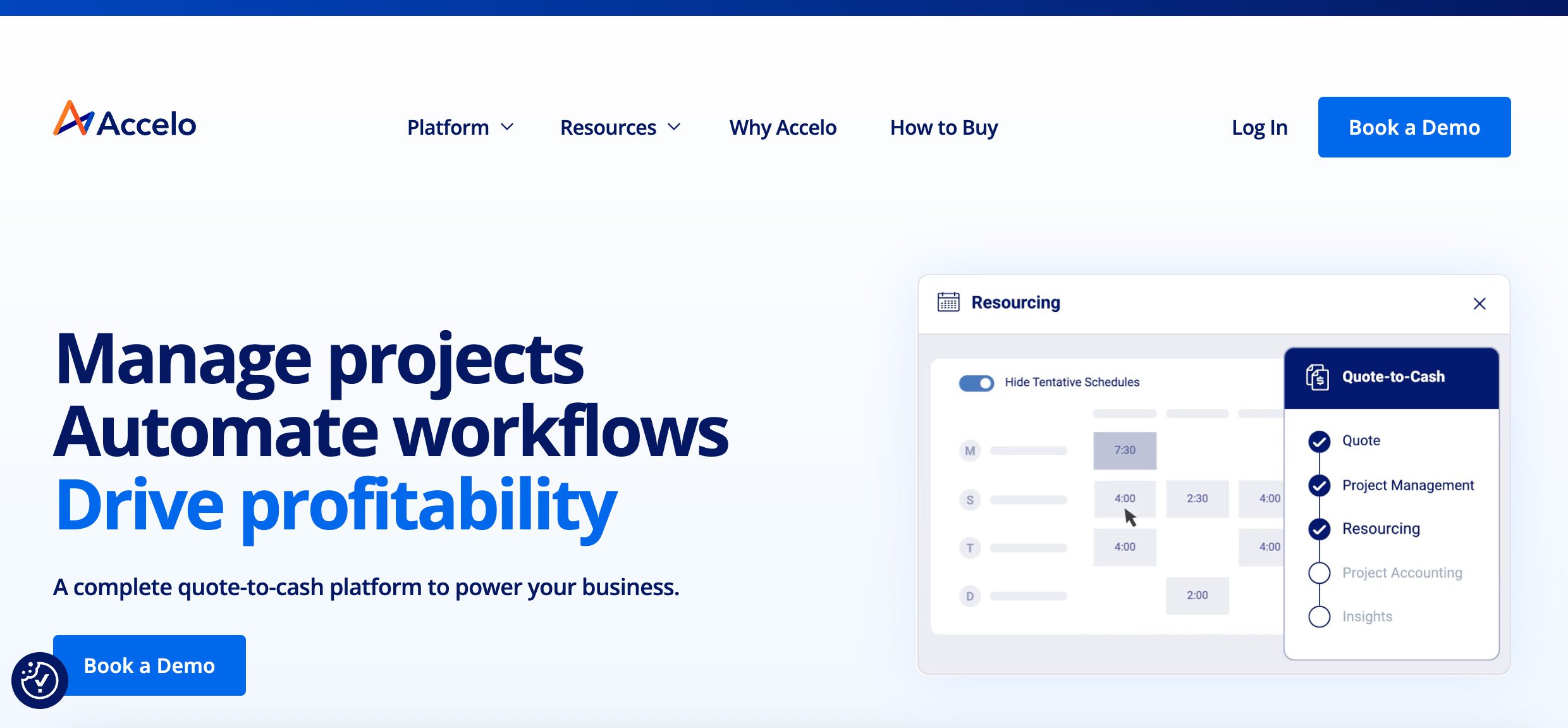
Accelo is an all-in-one professional services automation (PSA) platform that brings together project management, client communication, invoicing, time tracking, and automation in one workspace.
For some businesses, it may be the perfect way to manage everything from the first client conversation to the final invoice. But for other service-based teams, this all-in-one approach may come with a few trade-offs.
A learning curve that slows you down ⏳
Accelo is feature-rich, but that also means it can feel overwhelming at the start. For teams that want to set up simple workflows, track time, or get projects moving quickly, the platform can feel more complex than expected. Small businesses and startups in particular may spend a significant amount of time figuring out how to fit their processes into Accelo’s structure. Without dedicated onboarding, that first stage can feel slow and frustrating.
Pricing that can escalate 💰
Accelo’s tiered pricing means you pay separately for core modules like Sales, Projects, Retainers, Tickets, and Billing. This flexibility sounds appealing, but costs can add up quickly once you need more than one module.
Less flexibility for unique workflows ⛔
No two professional services businesses operate the same way. Accelo’s core modules can be limiting if you want to customize processes. Adjusting task flows or adding extra steps often requires workarounds or development work, making it harder to adapt the platform to your specific needs.
Mobile app limitations 📱
With hybrid work now the norm, many teams require tools that perform just as well on mobile as on desktop. While Accelo has a mobile app, some users have reported that it feels dated and lacks real-time capabilities. For consultants, field teams, or remote workers who rely on updating projects, logging time, or connecting with clients on the go, this can be a barrier.
More features than you’ll use 🛠️
Accelo offers a wide range of functionality, but many teams may only need a fraction of it. If your business simply wants a CRM, some project management tools, and invoicing support, the platform can feel excessive.
For many professional services businesses, the decision to look for an Accelo alternative is about finding a solution that offers the right balance of features, flexibility, and ease of use without making you pay for or manage more than you actually need.
What to look for in the best Accelo alternatives
Before diving into the comparison, it helps to get a clear view of what really matters to your business. Depending on the size of your team, the type of work you do, and the level of complexity you’re willing to manage, here are some key things to consider:
- Ease of use and onboarding: Can your team get up and running without weeks of training?
- Project management and task tracking: How well does the platform handle timelines, deliverables, dependencies, and task management?
- Workflow automation: Does it streamline repetitive tasks like client onboarding or sending follow-up emails?
- Client management: Can you store client data, notes, and communications in one place?
- Invoicing and billing: Is it easy to send invoices, accept payments, and track overdue bills?
- Customization: Can you tweak dashboards, fields, and reports to match your workflows?
- Integrations: Does it connect with your other tools like Slack, Microsoft 365, QuickBooks, or G Suite?
- Scalability: Will it grow with you without tripling your costs?
Considering these criteria, let’s go over the top Accelo alternatives that service businesses are switching to.
Top Accelo alternatives
Here’s a closer look at the platforms that are winning over teams who have outgrown Accelo.
1. Method CRM – Best for QuickBooks integration and workflow customization
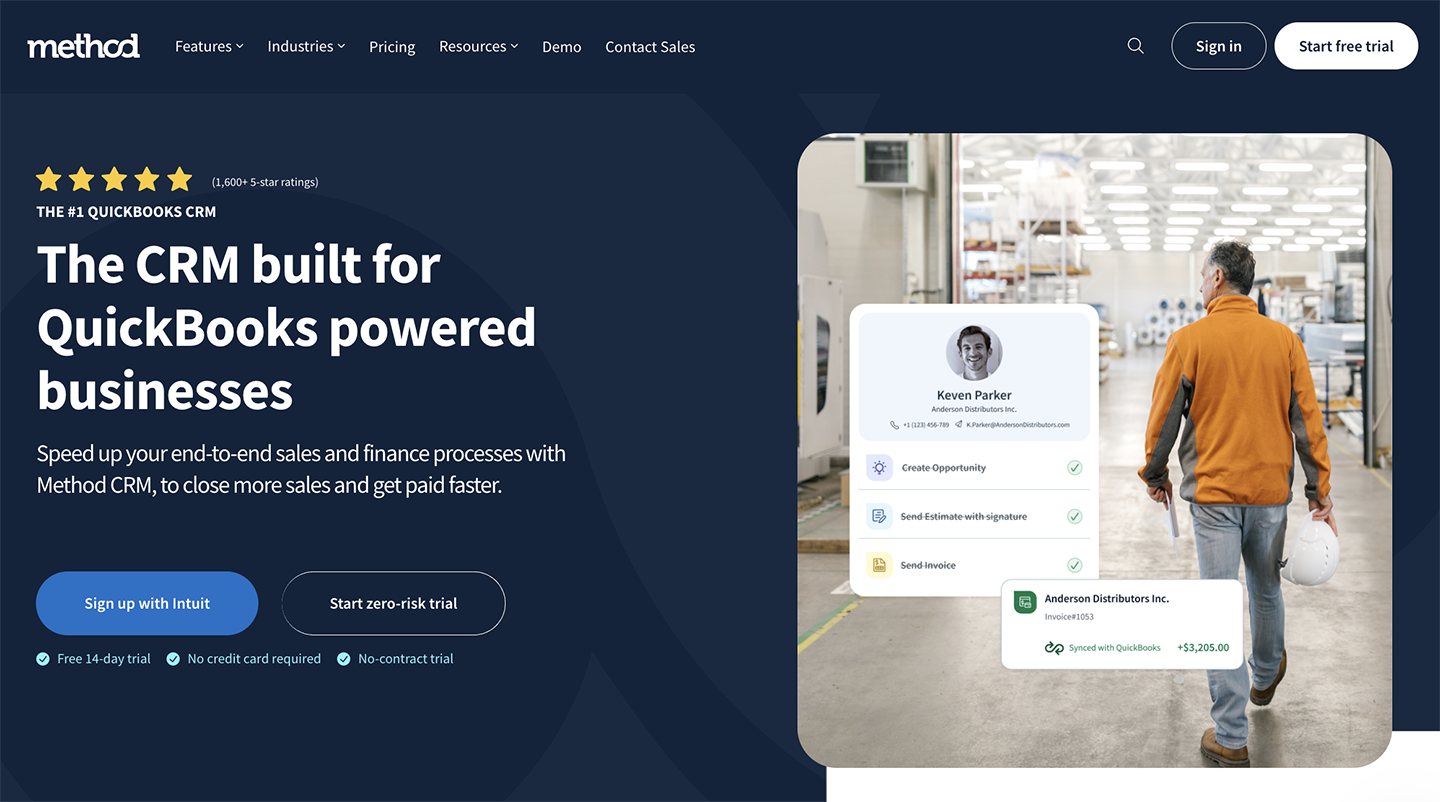
Method CRM is a standout for small businesses that rely on QuickBooks and want to build tailored workflows without hiring a developer. Its real-time, two-way sync with QuickBooks means your customer data, invoices, payments, and estimates stay perfectly aligned without needing double entry.
Method stands out for its high level of customization. You can automate client onboarding, build templates for proposals or service agreements, and create dashboards that highlight your most important metrics.
Key features:
- Deep QuickBooks integration.
- Customizable workflows and reports.
- Web-to-lead forms and email templates.
- Self-serve client portal for approvals and updates.
- Drag-and-drop task and activity views.
Best for: Small and mid-sized businesses that need flexibility and rely heavily on QuickBooks for accounting.
2. ClickUp – Great for team collaboration and project management
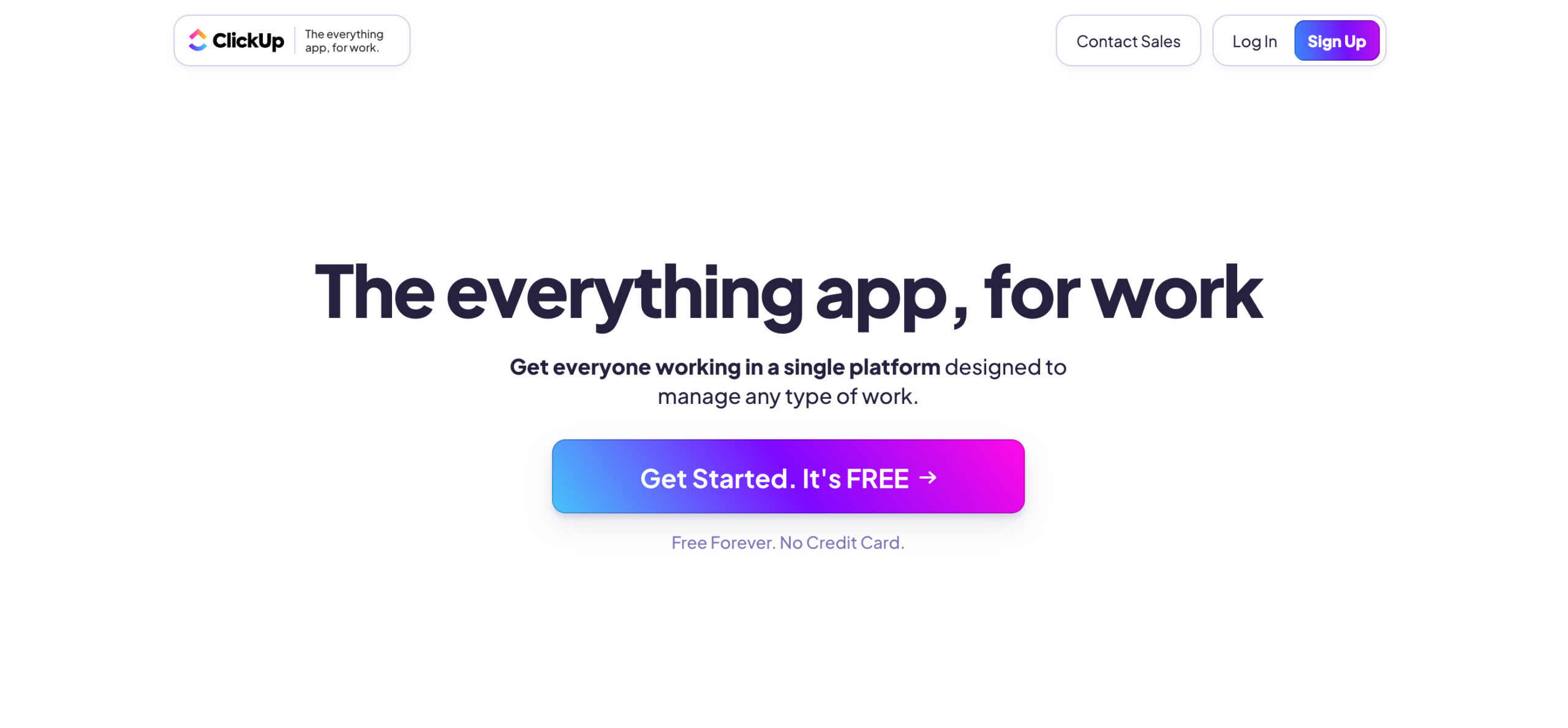
ClickUp is a rising star in the project management world and a popular Accelo alternative for teams that need flexibility. You can manage tasks, goals, timelines, and documents in one platform with strong team collaboration tools.
While it doesn’t offer native invoicing, ClickUp integrates well with platforms like Harvest or QuickBooks for billing purposes. If your main pain point with Accelo is task and project management, ClickUp is worth a try.
Key features:
- Custom views (list, board, Gantt, calendar).
- Time tracking and workload management.
- Automation and recurring tasks.
- Team collaboration tools like comments and mentions.
- Mobile app and Slack integration.
Best for: Teams focused on project planning and team collaboration who want an intuitive interface.
3. monday.com – A visual platform for project management and workflows
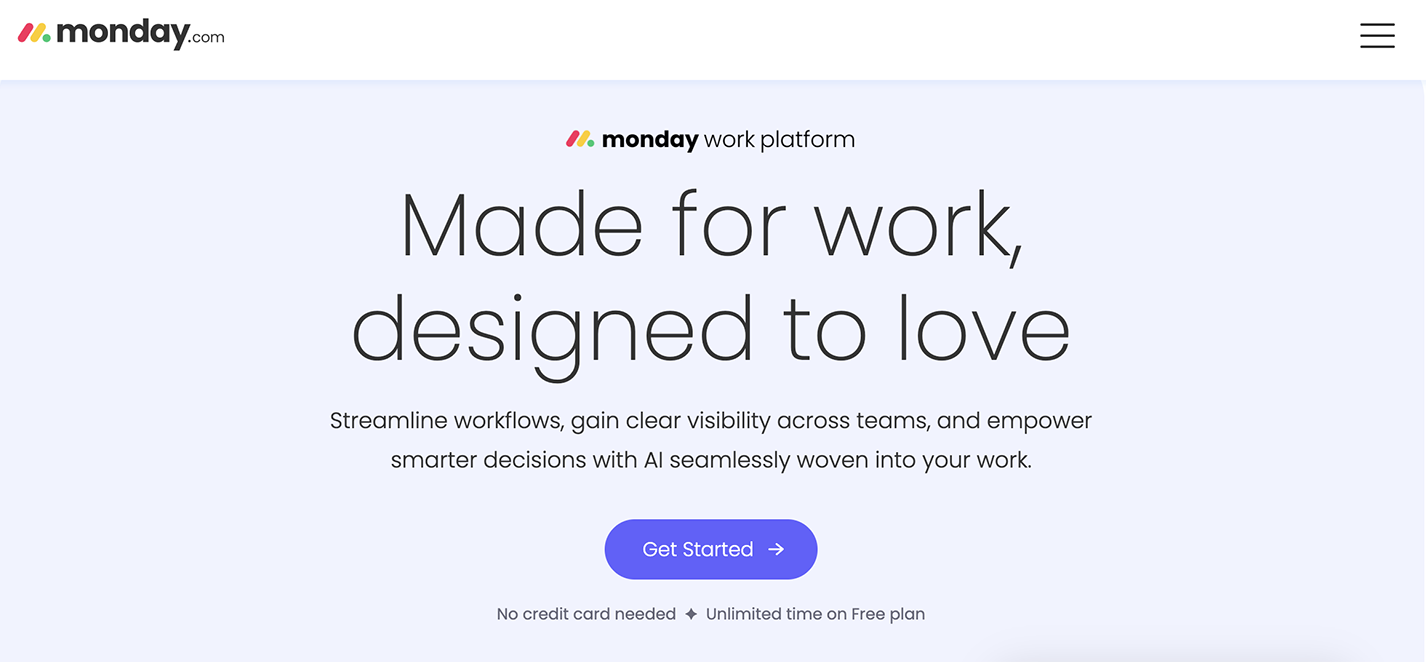
Monday.com has become a favourite among small teams and service businesses looking to streamline operations without a heavy setup. It offers a colorful, visual workspace with customizable boards, templates, and views that make project progress and client work easy to follow.
Its automation features help reduce repetitive tasks like status updates, notifications, or handoffs between departments. You can also connect monday.com with invoicing tools or embed dashboards to stay on top of KPIs.
Key features:
- Custom workflows with drag-and-drop ease.
- Automations to reduce admin work.
- Dashboards with real-time project metrics.
- Client collaboration features with limited access.
- Time tracking and workload views.
Best for: Creative agencies, consultancies, or startups that want a visual, flexible project management tool that doesn’t overcomplicate things.
4. HubSpot CRM – A free entry point with powerful upgrades
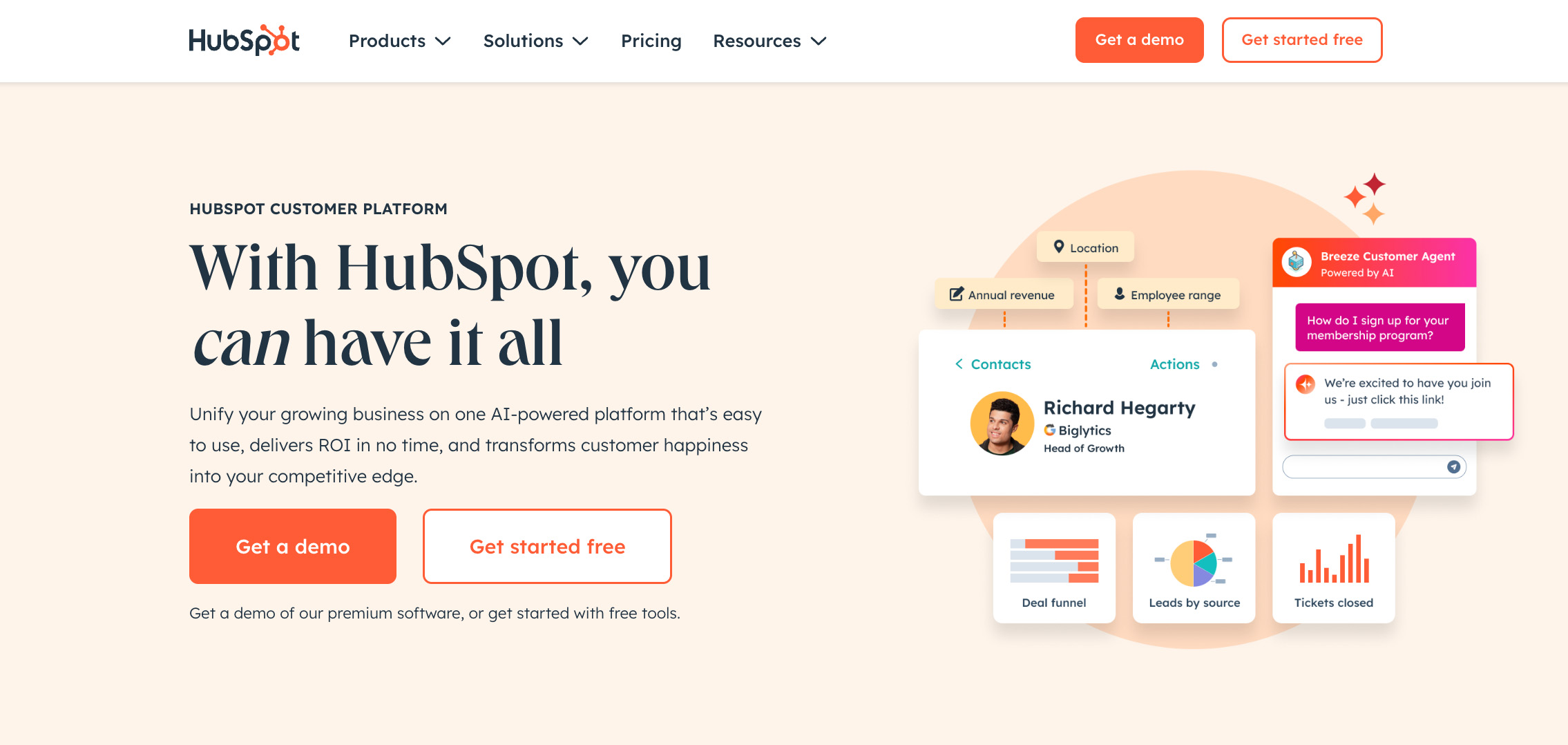
If your team wants to track sales, manage projects, and engage clients without spending a fortune upfront, HubSpot CRM is a solid option. It’s free to start and includes contact management, deal tracking, and email marketing features.
As your business grows, you can unlock full marketing automation, custom workflows, client portals, and advanced sales reporting.
Key features:
- Robust free CRM features.
- Marketing, sales, and service hubs.
- Workflow automation and segmentation.
- Customizable dashboards.
- Integration with Slack, Gmail, and more.
Best for: Businesses that want an all-in-one system that grows with them.
5. Zoho CRM – A cost-effective, all-in-one solution
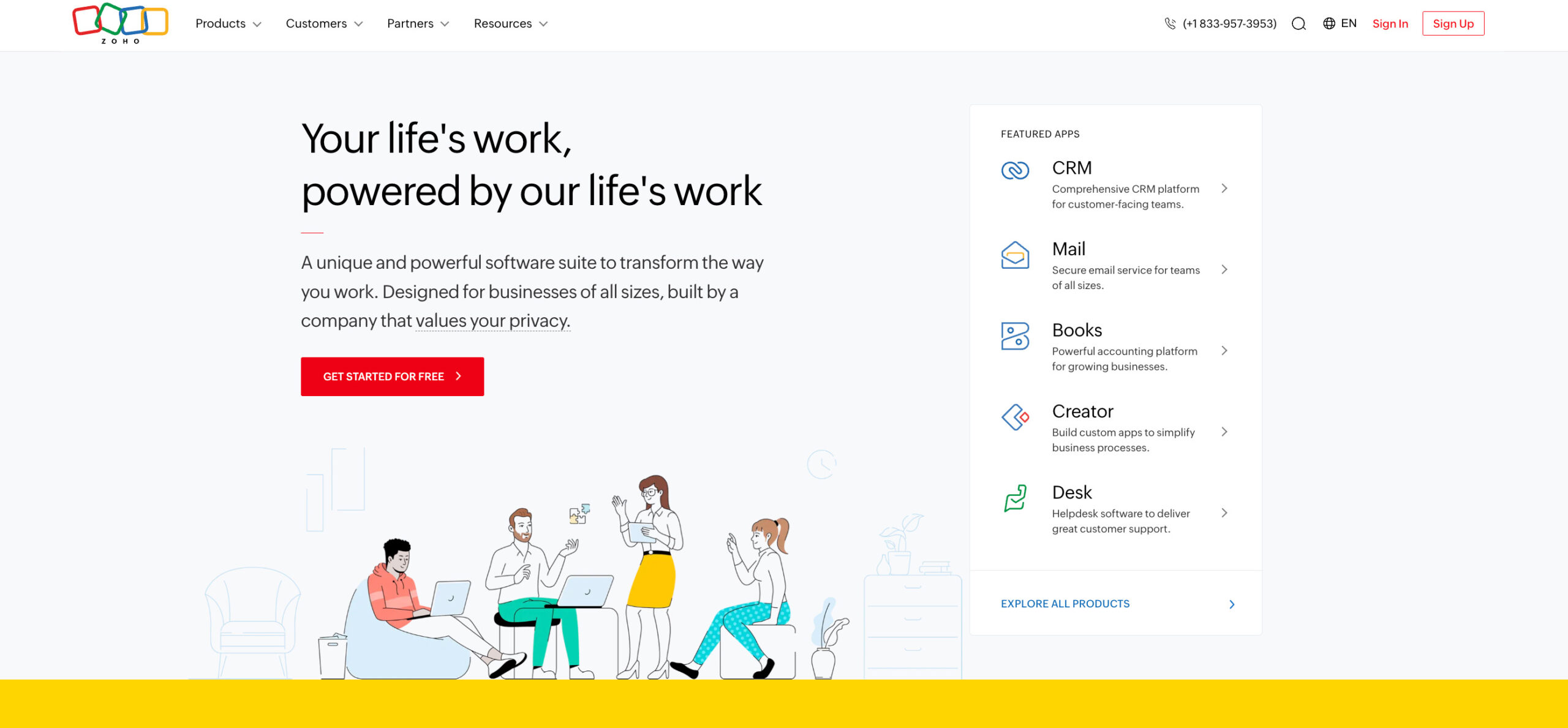
Zoho CRM offers a wide set of features at a lower price point, making it a top pick for small businesses looking to manage their customer relationships, sales pipeline, and communications from one platform.
It also offers a variety of add-ons across the Zoho ecosystem, including Zoho Projects, Zoho Books, and Zoho Desk. That way, you can build your ideal tech stack modularly.
Key features:
- CRM, email, social media, and sales automation.
- AI-powered suggestions and workflows.
- Forecasting tools for revenue and performance.
- Integrations with G Suite, Slack, and Microsoft 365.
- Mobile app and client portal options.
Best for: Businesses that want strong CRM functionality with pricing that stays reasonable as they grow.
6. Asana – Lightweight work management for small teams
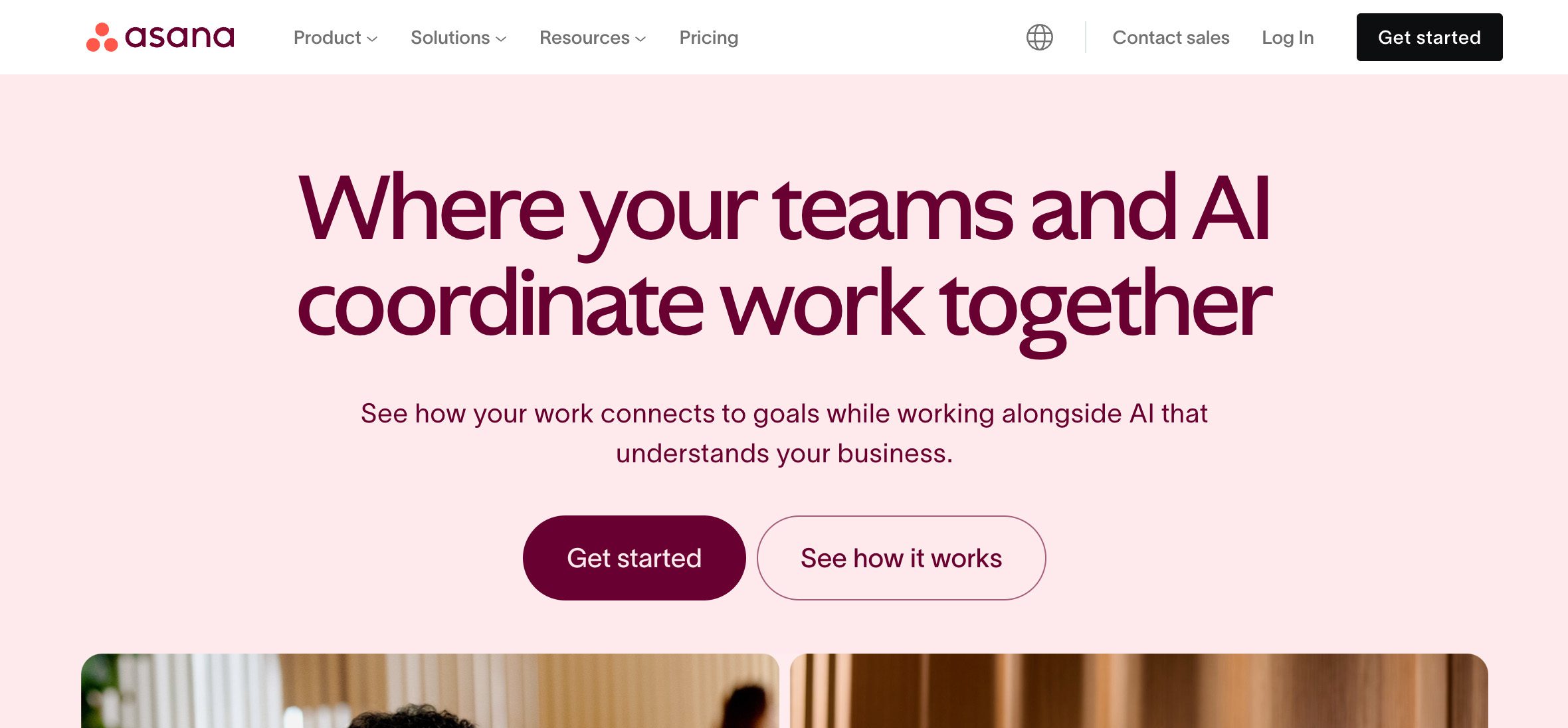
Asana keeps it simple with a task-oriented approach to project management. While it doesn’t offer invoicing or billing, it excels at helping teams track tasks, share updates, and stay aligned.
If your team just needs a reliable way to manage project workflows and daily work, Asana’s clean interface and helpful templates make it easy to get started.
Key features:
- Task lists, boards, timelines, and calendars.
- Workload and capacity views.
- Milestones and goal tracking.
- Easy integration with tools like Slack and Harvest.
- Templates for client onboarding, creative work, and more.
Best for: Small teams or service providers who don’t need heavy-duty billing but want clear work visibility and communication.
Feature showdown: How the top Accelo alternatives compare
If you’re looking for an Accelo alternative, it is not just about finding something simpler or less expensive. It is about making sure your team has the project management, automation, and reporting tools they need to run a service business smoothly.
Here is how the leading Accelo alternatives perform across the features that matter most.
Project planning: Gantt and Kanban views 👀
Good project planning starts with clear visibility. Many of the above-mentioned alternatives offer strong Gantt chart functionality, making it easier to visualize timelines, dependencies, and milestones in a clear and manageable way.
Kanban boards are essential for teams that prefer a visual approach. Platforms like ClickUp, monday.com, and Asana excel here, giving you drag-and-drop cards, color-coded tags, and intuitive layouts that make project planning feel like mapping out a journey rather than navigating a spreadsheet.
Resource and capacity management 📚
Balancing workloads and managing resources is one of the most challenging parts of service delivery. While Accelo shows you basic details about who is working on what, it can lack real-time capacity insights, especially for larger teams.
Alternatives now offer live resource dashboards that let managers see who is overbooked, who is available, and how work is distributed. Tools like monday.com and Zoho CRM help teams plan effectively, avoid burnout, and keep resource management running smoothly.
Time tracking and billable utilization ⏱️
Accelo includes a built-in time tracker, but some users experience syncing issues or find it difficult to create useful reports. Competitors like ClickUp and Method CRM offer more flexible and reliable time tracking with features such as automatic timers, mobile entry, and calendar integrations.
Beyond just recording hours, many alternatives provide insights on billable utilization, helping you see exactly how much of your team’s time goes toward client work, admin, or internal projects. These insights are key to improving profitability and planning future work.
Invoicing and recurring billing 🧾
Accelo’s invoicing tools work, but they can feel restrictive, particularly if you bill for a mix of time, fixed-price projects, and retainers. Some users also say the setup is not intuitive.
Many service businesses turn to platforms like QuickBooks Online or Method CRM for greater flexibility. These solutions allow easier handling of recurring billing, tax rules, and multiple currencies, while making it simple to track profitability by client, project, or team member.
Automation and workflow templates 💻
Automation is one of Accelo’s main selling points, but it often requires significant setup and training. For teams that want something ready to go, this can be a hurdle.
monday.com, ClickUp, and HubSpot offer prebuilt workflow templates for client onboarding, task management, and invoice follow-ups. These allow teams to start automating repetitive tasks without a complex setup. Many of these platforms also include conditional logic and real-time triggers so workflows adjust automatically based on activity.
Integrations and open API access 🌐
A CRM or project management tool is only as good as the tools it connects with. While Accelo integrates with some platforms, its options are more limited than those of many competitors.
Alternatives such as ClickUp, Asana, and monday.com provide stronger integrations with Slack, Microsoft Teams, HubSpot, Salesforce, and accounting software. They also offer robust open APIs for custom connections, making it easier to automate processes and reduce manual updates across systems.
Dashboards and forecasting 📊
Scaling a service business requires knowing what is ahead. Accelo’s dashboards can make it difficult to get a complete picture without manual workarounds or exporting data.
Modern alternatives focus on clean, real-time dashboards that bring project tracking, sales forecasting, and resource planning into one place.
Pricing comparison: What you’ll pay as you scale
Here’s how these tools compare when it comes to pricing, add-ons, and team scaling:
| Tool | Starting Price | Free Plan Available? | Key Notes |
| Method CRM | From $27/user/month | Offers free 14-day trial | Best value for QuickBooks users who want automation and portals |
| ClickUp | From $7/user/month | Yes | Strong project management features with free tier |
| monday.com | From $9/user/month | Yes | Flexible visual workflows with free plan for small teams |
| HubSpot CRM | From $9/seat/month | Yes | Full sales and marketing suite, but costs scale quickly |
| Zoho CRM | From $14/user/month | Yes | Budget-friendly with a wide range of features |
| Asana | From $10.99/user/month | Yes | Simple, intuitive project management for teams of all sizes |
Be sure to account for your team’s size, usage limits, and whether the features you need are locked behind paywalls.
Read more: How a tax advisory firm ditched paper-heavy workflows for 10x faster billing.
Decision table — match your business needs
When choosing an Accelo alternative, the best choice will depend on your priorities, whether that’s seamless QuickBooks integration, flexible project management, deeper automation, or a balance of features and budget.
The table below maps common service business use cases against six of the top contenders so you can quickly see which ones align most closely with your needs.
| Use Case | Method CRM | ClickUp | monday.com | HubSpot CRM | Zoho CRM | Asana |
| Best for QuickBooks Users | 🟢 True two-way QuickBooks sync for sales and accounting alignment | 🟡 Limited QuickBooks integration via third party | 🟡 Limited QuickBooks integration via third party | 🟡 QuickBooks integration through connector | 🟡 QuickBooks integration available (through Zoho applications or connector) | 🔴 No direct QuickBooks integration |
| Best for Project Management | 🟢 Custom workflows for service delivery | 🟢 Advanced Gantt and Kanban views | 🟢 Strong visual boards and timeline views | 🔴 Basic task tools, more focused on sales | 🟢 Flexible task and project modules | 🟢 Intuitive Kanban and list views |
| Best for Workflow Automation | 🟢 No-code automation tied to customer data | 🟢 Advanced conditional automations | 🟢 Prebuilt automation recipes | 🟢 Marketing and sales automation built in | 🟢 Workflow builder in all plans | 🟢 Task-based automation rules |
| Best for Customization | 🟢 Deep custom fields, portals, and dashboards | 🟢 Highly configurable layouts and views | 🟢 Flexible boards, dashboards, and automations | 🟡 Limited customization unless on higher tiers | 🟢 Extensive custom modules and layouts | 🟢Custom fields and workflows |
| Best for Budget-Friendly Scaling | 🟢 Affordable for QuickBooks users, replaces multiple tools | 🟢 Free plan and low-cost tiers | 🟢 Scales well with small-to-mid teams | 🟢 Free plan, but paid tiers can be costly | 🟢 Feature-rich at a lower cost | 🟢 Low-cost options for small teams |
Frequently asked questions
Is Accelo a CRM?
Accelo offers CRM-like features, but it’s primarily a professional services automation (PSA) platform. If you need deeper customer relationship management, consider Method CRM or HubSpot.
What’s the best Accelo alternative for small businesses?
ClickUp or Monday.com offer great flexibility at lower pricing tiers. For QuickBooks users, Method CRM offers deeper financial sync and automation.
Which tools are best for profitability tracking?
Zoho CRM and Method CRM are strong in this area, with built-in forecasting, budget tracking, and financial dashboards.
Can I keep my invoicing process on a new platform?
Yes. Method CRM offers strong invoicing features tied to time entries and project milestones.
Final verdict
The best Accelo alternative depends on your business needs, current workflows, and team size. If you want full control over your client work, real-time dashboards, and automation tools that simplify operations, take a closer look at Method CRM. It’s a scalable platform purpose-built for service businesses that want to optimize their processes and grow. 🌱






